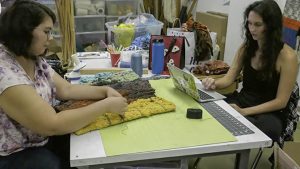Among the 900 graduates who earned a University of Hawaiʻi degree in December 2017 was Miles Nishikawa. Nishikawa is not a traditional student, having left school in 1985 to work full-time. He returned last year through the Outreach College’s Come Back to Mānoa program to finish his studies and earn his degree in psychology.
Come Back to Mānoa reaches out to eligible undergraduate seniors who voluntarily departed UH Mānoa before completing their first bachelor’s degree. Students in this situation most often cited personal reasons, financial concerns and academic issues as a reason for leaving. Others were near completion but unable to finish degree requirements.
Since the program was initiated during summer 2014, more than 1,962 students who left UH Mānoa were identified as in good standing with a significant number of completed credits—but without a degree. Given the statistics that show the value of a college degree, helping these students complete their education is one of the main goals for the Come Back to Mānoa program.
Of the identified students, 384 (more than 19 percent) responded, 168 became active in the program, and 113 students—more than two thirds—graduated, with another 17 on their way toward completing their degree.

A success story
Nishikawa stumbled across the Come Back to Mānoa website in a pursuit of new interests. He found out most of his credits were transferable and he would need only one year of classes.
Designed to fit around participants’ employment and family schedules, Come Back to Mānoa also helped him overcome his fear of returning to school and the experience inspired him to explore different opportunities. Nishikawa supported his knowledge in the classroom by participating in internships at Kalihi-Pālama Health Center and volunteering with at-risk youth at the Kalihi YMCA.
“The Come Back to Mānoa program was encouraging because it provided for me the opportunity to enroll the very next semester,” said Nishikawa. “It was designed according to my schedule and basically it was very non-intimidating.”
“It tells people like myself that they’re not quitters or they’re not giving up on their education,” added Nishikawa.
Come Back to Mānoa coordinator Shannon Johnson sees the program as being most helpful by acting as a single point of contact to help students navigate the final hurdles to graduation in a non-judgmental environment.
“What I do see in Miles that I often times see in other students that I’m working with through this program is the interest, the excitement about learning coming back,” said Johnson. “I’m here to assist them in whatever way they need. I can help them navigate the system. I can review their records with them.”
Johnson provides one-on-one coaching and advocacy to help identify a plan for the student’s quickest path to graduation. She provides individualized support to discuss course programs, financial status, and semester registration to help students overcome barriers to completion.

Second timeʻs the charm
For Amilia “Mimi” Castro, the second time was the charm. In 2015, Castro stopped attending UH Mānoa when her commute from Waianae became a challenge. Castro met Johnson through a knitters group. At Johnson’s recommendation, Castro reached out and by spring 2017, Castro was attending UH Mānoa full-time, and is pursuing her degree in art.
“I think what’s most valuable about this program is that you feel like you have someone specific helping you, it’s not just this anonymous email or like a mailing bot,” said Castro. “So, it just feels like a really personal experience that helped me feel so much more comfortable coming back and it’s almost like a support system within UH helping me.”
“We tried to innovate this program so that the students would be very successful at the program and finishing their degrees,” added Outreach College Dean William “Bill” Chismar.
For more information, visit the Come Back to Mānoa website.

